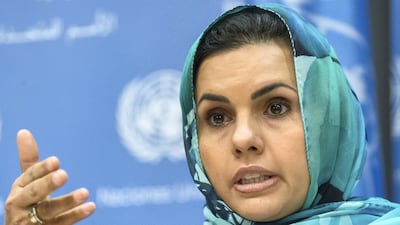Women involved in the Libyan peace process want an end to power-sharing deals they say will increase sectarianism in the country and keep women out of decision making.
The United Nations is leading the Libyan Political Dialogue Forum, which aims to agree a road map to elections at the end of 2021.
The 75 participants in the process, selected by the UN after months of consultations with Libyans from all over the country, must agree on a unified transitional government that will oversee the vote.
Among them are 18 women who are human and women's rights activists, lawyers, parliamentarians and female representatives of the State Council.
The ousting of former Libyan dictator Muammar Qaddafi in 2011 left a power vacuum that was filled by the Tripoli-based Government of National Accord (GNA) and Khalifa Haftar’s eastern-based Libyan National Army (LNA).
Previous diplomatic efforts aimed at ending the war failed, meaning the latest round has come farther than any other in forming a conclusion.
Libya’s warring factions signed a ceasefire deal last month that called for the withdrawal of all foreign forces from the country for a minimum of three months, as well as a prisoner exchange.
Some of the women involved in the process feel the process is focusing too much on the formation of a transitional government and not enough on the long term.
"The crisis in Libya is multidimensional, that's why the country needs a comprehensive approach," Zahra' Langhi, a women's rights activist participating in the dialogue, told The National.
"Yes you will need state building but what is going on with us is not state building at all, it’s power sharing just like in Iraq and Lebanon."
Some officials in Iraq and Lebanon believe that sectarianism has paralysed political, economic and social progress in both nations as politicians desperately cling on to power instead of working together.
Sectarian tensions in Iraq peaked after the fall of former leader Saddam Hussein in 2003 where various politicians achieved little because of violence directed at the country's ethnic and religious minorities.
What Libyans need is a nation-building process that is associated with national identity and not only political and civil rights but social and economic rights, said Ms Langhi, co-founder of the Libyan Women’s Platform for Peace movement.
Libya’s national charter must address the root causes of the crisis, she said, and that it needs to form a national identity, address conflict-related sexual violence and violence against women.
“If these are not addressed then we are not scratching the surface – this is not sustainable peace,” she said.
Women’s role in Libya’s road map
The dialogue has so far established a road map that locks in 30 per cent female representation in the next government, Lamees BenSaad, a member of the political dialogue, told The National.
“I see this as a great achievement. We will have a good position and stance in the next government,” she said.
Members also discussed the possibility that one of the next prime minister's deputies will be a woman, she said, asserting that "this will happen".
Ms BenSaad said the men at the negotiating table are broadly supportive of including women in high-level positions.
"There's been men on the table who have been advocating a big role for women to work in, they have even called for a female prime minister," she said, something never discussed in previous talks.
For the very first time, men on the table are “feeling the heat”, Ms Langhi said.
“We have been pushing for this for some time, we aimed high to suggest that someone from the presidential council should be a woman,” she said.
But Ms Langhi said the proposed Cabinet positions are set up like a "muhasasa system" whereby seats in government are divided between various ethno-sectarian groups around the country.
Women involved in the process are calling for a different approach, she said.
“They don't share power, they keep it within themselves and their inner circle, we need to have a shift of paradigm, to move away from power sharing,” Ms Langhi said.
“We want fresh faces based on technocrat criteria.”
Ms BenSaad said that from her previous experiences the female members of the dialogue have not seen “such seriousness from the 75 participations” to find some solution to the conflict.
“I want the country to unite under one sovereign national government that will ensure that Libyans get their democratic rights,” she said.
Both women hope that having a strong female participation in the dialogue will ensure a strong female presence in the next government and ministries.
"Women are not out to get an equal slice of the cake, they are out to change the recipe," Ms Langi said, adding that female participation will make peace talks and decision making less corrupt and more transparent.


